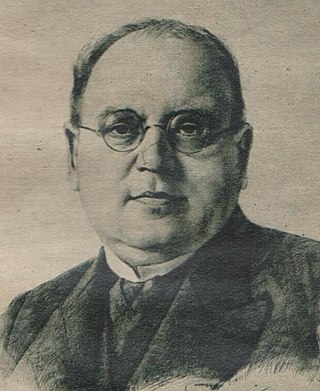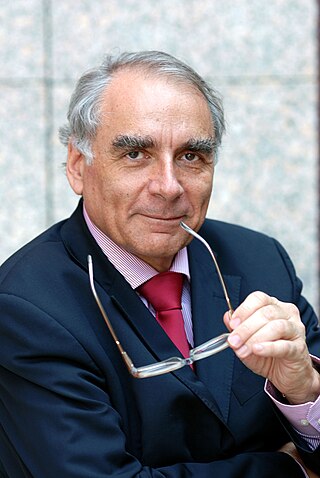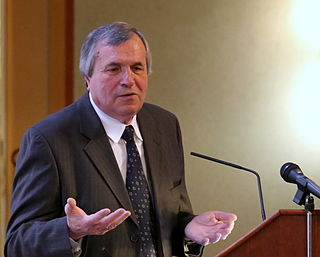
Döme Sztójay was a Hungarian soldier and diplomat of Serb origin, who served as Prime Minister of Hungary in 1944, during World War II.

Lajos Aulich was the third Minister of War of the Hungarian State.

György Bónis was a Hungarian jurist, researcher of Hungarian and European legal history.

Hildebrand Dezső Várkonyi was a monk and a teacher of Bencés order. Várkonyi was a respected and well-known Hungarian philosopher, pedagogue and psychologist.
Iván Tibor Berend is a Hungarian historian and teacher who served as President of the Hungarian Academy of Sciences from 1985 until 1990. He was a member of Hungarian Socialist Workers' Party's Central Committee between 1988 and 1989. Since 1990 he has been living in Los Angeles and teaching at UCLA. In 2015, he was elected to the American Academy of Arts and Sciences.

Dr. Gusztáv Bölcskei is a Hungarian Reformed bishop and a theologian. He is the former clerical president of the Synod of the Reformed Church in Hungary and bishop of Debrecen. Bölcskei is Executive Committee Member of the World Communion of Reformed Churches, former president of WCRC Europe, and a professor of church sociology at Debrecen Reformed Theological University.
Imre Dimény was a Hungarian agrarian engineer and Communist politician, who served as Minister of Agriculture and Food between 1967 and 1975. He was a member of the Hungarian Academy of Sciences.
Gábor Vékony was a Hungarian historian, archaeologist and linguist, associate professor at Faculty of Humanities of the Eötvös Loránd University, Candidate of Sciences in History. He was an expert of the rovás scripts and a researcher of Hungarian prehistory.

István Stumpf is a Hungarian lawyer, political scientist, sociologist, university professor, political science PhD, former constitutional justice at the Constitutional Court of Hungary. From 1991 to 1994 he was the youth policy adviser to the president of Hungary, Árpád Göncz. He also served as minister of the Prime Minister's Office from 1998 - 2002 in the first cabinet of Viktor Orbán. In the beginning of 2021 February he was appointed for a term of 2 years as government commissioner responsible for model change of universities.

Gyula Kornis was a Hungarian Piarist, philosopher, educator, professor and politician, who served as Speaker of the House of Representatives for a short time in 1938.

Tibor Frank was a Hungarian historian who was professor of history at the School of English and American Studies of the Faculty of Humanities of the Eötvös Loránd University (ELTE). He was director of its School of English and American Studies. From 2013 he was corresponding member of the Hungarian Academy of Sciences (MTA), as of 2019 he was a full member.

Ádám Anderle was a Hungarian historian, hispanist, full (university) professor, professor emeritus of Faculty of Arts, University of Szeged (SZTE). He was active in research of the relationship between Latin America and Hungary for decades. He was fluent in Hungarian and Spanish.

This is a list of writings published by the Hungarian historian Sándor Csernus. He has written and published his works in Hungarian, English, German, and French.

Csaba Böjte is an ethnic Hungarian Franciscan friar, author, humanitarian, and director and founder of the Saint Francis Foundation of Deva, Romania. His foundation works to rescue homeless orphans in Transylvania.

Emőke Bagdy is a Hungarian clinical psychologist, psychotherapist, clinical supervisor, professor emerita at the Károli Gáspár University of the Reformed Church in Hungary (KRE), and former director of the National Institute of Psychiatry and Neurology. Her research, books, papers and talks focus on psychotherapy, health psychology and foundational problems of clinical psychology and clinical supervision.
Zoltán Szabó was a Hungarian botanist, geneticist, and professor. He was a full member of the Hungarian Academy of Sciences. His work covered many areas of botany, including plant taxonomy, plant morphology and anatomy, plant geography and floristics, agrobotany and mycology, but he achieved his most significant results in genetic research. Szabó edited the exsiccata Plantae imperii Hungarici. In the taxonomic literature his name abbreviation is "Szabó".

The Jászai Mari Award is a state award, which was created by the Hungarian government in 1953 as an award for theatrical arts. The award was named in honour of the Hungarian actress Mari Jászai.

Tamás Adamik is a Hungarian classical philologist and linguist, literary historian, and translator. He joined Eötvös Loránd University in Budapest as a professor in 1973, where he worked in its Latin department until he took emeritus status in 2002. Adamik's areas of research focus have included Roman literature in Latin, Vulgar Latin, and Koine Greek; as well as early Christian literature.














